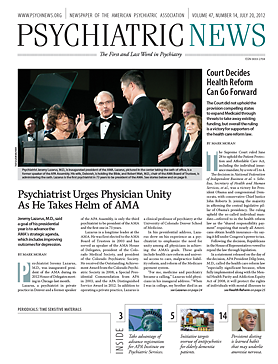Psychiatrist Jeremy Lazarus, M.D., was inaugurated president of the AMA during its 2012 House of Delegates meeting in Chicago last month.
Lazarus, a psychiatrist in private practice in Denver and a former speaker of the APA Assembly, is only the third psychiatrist to be president of the AMA and the first one in 73 years.
Lazarus is a longtime leader at the AMA. He was first elected to the AMA Board of Trustees in 2003 and has served as speaker of the AMA House of Delegates, president of the Colorado Medical Society, and president of the Colorado Psychiatric Society. He received the Outstanding Achievement Award from the Colorado Psychiatric Society in 2008, a Special Presidential Commendation from APA in 2003, and the APA Distinguished Service Award in 2012. In addition to operating a private practice, Lazarus is a clinical professor of psychiatry at the University of Colorado Denver School of Medicine.
In his presidential address, Lazarus drew on his experience as a psychiatrist to emphasize the need for unity among all physicians in achieving the AMA’s goals. These goals include health care reform and universal access to care, malpractice liability reform, and reform of the Medicare payment system.
“For me, medicine and psychiatry became a calling,” Lazarus told physicians in his inaugural address. “When I was in college, my brother died in an accident. That tragedy fueled my desire to do something different, something that made a difference to help people— to become a physician. I wanted to help repair shattered minds, to guide people through the minefields of depression or personality disorders or crushing changes in circumstance. I wanted to help pull a profoundly depressed person back from the ledge of potential suicide and watch him grow from a troubled adolescent into a productive adult.
“In our specialty, taking people whose mental health is in jeopardy and helping them toward recovery is like watching someone walk again or curing cancer,” Lazarus said. “When something is wrong in the brain or mind, it affects the whole person. The challenge is how we determine what is going on—whether it is psychological or neurochemical or both.
“We are trained to listen to what is said out loud and what isn’t said at all, to listen to all sides and help people find their own path. By listening and working to find common ground, I want to bring greater unity to our AMA. … In the 21st century we can advance and grow only by incorporating the insights of physicians from all specialties, cultures, practice settings, regions, and ideologies,” Lazarus said. “There is a real opportunity, regardless of the political paralysis in Washington, for us to unify and promote the practice of medicine to AMA members and nonmember physicians around the country. But any success will materialize only if we are unified on the issues that matter most to us and to our patients.”
As examples of how the AMA’s work affects all physicians, Lazarus cited the organization’s involvement in the settlement of a lawsuit against United Healthcare that resulted in the return of some $200 million to physicians and the successful effort to delay implementation of the ICD-10.
John McIntyre, M.D., past chair of the Section Council on Psychiatry and a long-time delegate from APA to the AMA house, called Lazarus “a remarkable, proven leader who has made extensive contributions” to APA and the AMA over several decades.
“He has been a role model as a physician in his dedication to achieve what is in the best interest of patients,” McIntyre said. “He and his wife, Debbie, will continue to be great ambassadors for the medical profession. In this crucial time for health care reform and its impact on patients and the profession of medicine, our AMA could not have a better leader than Jeremy Lazarus.”
In an interview in which Lazarus talked with APA President Dilip Jeste, M.D., Lazarus outlined his goals and priorities for his presidential year. These include working with specialty societies like APA to develop strategies for improving health outcomes for illnesses—depression, diabetes, heart disease—that have the greatest disease burden. Other goals include medical education reform and health system delivery reform.
“We are looking at health care delivery systems that we believe should be physician led,” Lazarus told Jeste. “And I will be emphasizing the need to make sure that mental illness and treatment for mental illness is integrated into these emerging health care systems.”
The election of Lazarus as president and Patrice Harris, M.D., as a board member, as well as the presence of psychiatrists on nearly all of the important councils of the AMA, is evidence of the enormous strength of the APA Section Council on Psychiatry and the respect it has garnered from the rest of the AMA House of Delegates. Past APA President Joseph T. English, M.D., a long-time member of the section council, talked to
Psychiatric News in a video interview about the growth and maturation of the section council.


